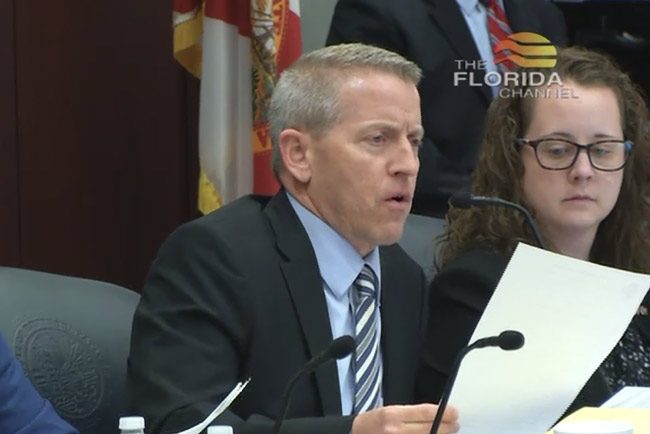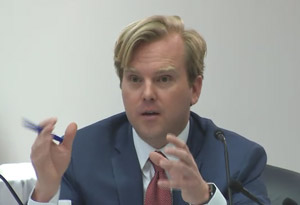
The House Judiciary Committee Palm Coast’s Paul Renner chairs pulled a Jekyll and Hyde with a pair of bills addressing felon rights in a four-hour hearing Tuesday.
In the first half of the meeting it approved a sweeping bill Renner introduced that reforms criminal justice’s disproportionate sentencing guidelines, takes steps away from mandatory minimum sentences and reduces obstacles in the way of felons seeking licenses and other means to reenter the workforce. The bill drew the kind of bipartisan support that will enable Renner to speak of his ability to cross the aisle, plaudits from Ben Diamond, the committee’s ranking Democrat, and even some surprise from some that bi-partisanship on that scale was still possible in what Diamond himself described as a “fractured” political environment.
In the second half of the meeting, however, it was back to strict partisanship as the committee, with Renner’s full support, approved House Bill 7089, which defines strict and numerous parameters of Amendment 4, the constitutional amendment restoring voting rights to felon that voters approved with a nearly-65 percent margin last November.
The bill, sponsored by J.W. Grant, the Tampa Republican who was never at a loss for oratory during the two-hour debate, included Grant’s amendment that softened some of the harder edges of the original bill, but not nearly enough to overcome strong opposition from interest groups, two felons who spoke to the committee and the committee’s Democrats. The bill passed on a strict party-line vote, 12-6, as it or its companion bill has in the Senate.
Neither the House nor the Senate bill now include attempted murder in the list of exclusions from voter rights, as the Senate bill initially did. But both bills still include the
repayment of almost all fees, fines and restitution before felons may regain the right to vote. That’s the central issue at the heart of the opposition to the bill, including opposition from sponsors of Amendment 4.
Grant’s House bill now makes some allowances for the waiver of costs and restitution in some circumstances. It includes a provision that ensures that costs and interest accrued after the imposition of sentence are not held against the felon’s right to vote. And it creates a “safe harbor” when felons fill out paperwork at supervisors of elections’ offices and claim they are eligible to vote, even though they may not be: because of the ongoing confusion, they will not be prosecuted on that account, though it’s a third-degree felony to misrepresent one’s eligibility status (but only if the misrepresentation is committed with criminal intent).
Those provisions won the bill some guarded approval even from Democratic members of the committee, but not enough to address their larger concerns. For example, if the victim waives restitution, it’s no longer an obstacle to voting rights. But a judge converting costs and restitution to a civil judgment is not a waiver. Those costs remain a prohibition on voting until they are fully paid.

There was considerable opposition to the bill’s addition of crimes that exclude felons from regaining the right to vote. The amendment specified that murder or felony sexual offenses would be disqualifiers. But the bill added such crimes as racketeering activity that “involved at least one sexual offense” included in the prohibitions, and female genital mutilation, a felony crime in Florida, but not a crime that triggers the sexual offender designation.
“Our only responsibility is to do exactly what was put before the voters,” Grant said. A committee member who opposed Grant’s amendment and ACLU representative said the added wording to the bill on certain sexual offenses does not hew to voters’ will, but to legislative fiat–especially since Florida law defines sexual offenses in relation to sexual offender status.
“Your scope of review as the Legislature is to pass legislation that enhances or supplements the rights enumerated in Amendment 4 and therefore the Constitution, not to restrict them,” Kirk Bailey, the political director for ACLU of Florida, said. “In our view the provisions of the bill have the effect of restricting the franchise for individuals.”
But much of the debate centered on financial obligations.
Many opponents of the measure argued that what an advocate of the amendment told the Supreme Court and what even advocates’ websites stated does not have the validity of Amendment 4’s language as approved by voters. Grant said that was “doing a 180” on voter intent. Renner quoted from one of the advocates’ websites (the Florida Rights Restoration Coalition) to say that the rules were being changed after the fact. “Unfortunately we’re now being told after the fact that it should exclude some of those conditions. We are bound by what the voters did. We can only discern what we were given in defining undefined terms,” Renner said.
![]()
HB1079: Felons’ Right to Vote and Restrictions
Click to access hb1079-judiciary-committee.pdf





























Richard says
Get over it people! Pay up or shut the FU!
Robin Polletta says
This is just another example of ‘Jim Crow’ efforts to circumvent the votes’ intent of restoring the right to vote to those who have completed their sentences and parole.
Weldon Ryan says
A great demonstration of the importance of a vote. Here again augmenting the rules to stay in power! Power corrupts!!!